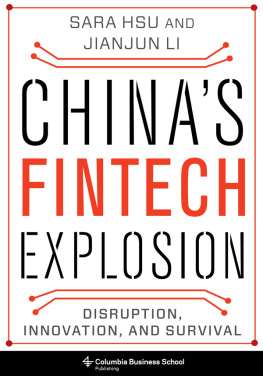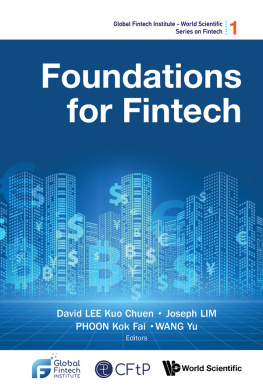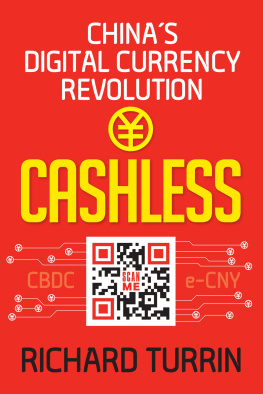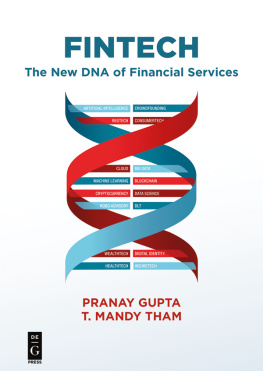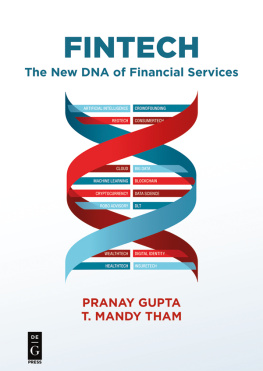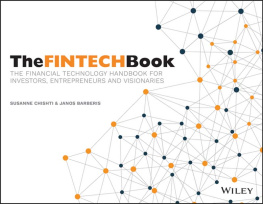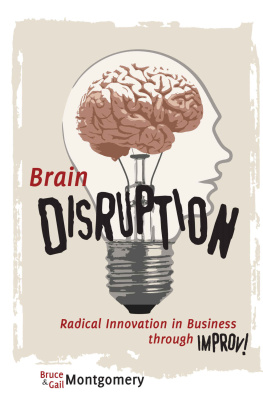Table of Contents
Chinas Fintech Explosion
CHINAS
FINTECH
EXPLOSION
Disruption, Innovation, and Survival
Sara Hsu and Jianjun Li
Columbia University Press
New York
Columbia University Press
Publishers Since 1893
New York Chichester, West Sussex
cup.columbia.edu
Copyright 2020 Columbia University Press
All rights reserved
E-ISBN 978-0-231-55171-7
Library of Congress Cataloging-in-Publication Data
Names: Hsu, Sara, author.
Title: Chinas fintech explosion: disruption, innovation, and survival / Sara Hsu and Jianjun Li.
Description: New York: Columbia University Press, [2020] | Includes bibliographical references and index.
Identifiers: LCCN 2019057856 (print) | LCCN 2019057857 (ebook) | ISBN 9780231196567 (cloth) | ISBN 9780231551717 (ebook)
Subjects: LCSH: FinanceChina. | FinanceTechnological innovationsChina. | Financial services industryTechnological innovationsChina.
Classification: LCC HG187.C6 H78 2020 (print) | LCC HG187.C6 (ebook) | DDC 332.0951dc23
LC record available at https://lccn.loc.gov/2019057856
LC ebook record available at https://lccn.loc.gov/2019057857
A Columbia University Press E-book.
CUP would be pleased to hear about your reading experience with this e-book at .
Cover design: Noah Arlow
Contents
FRESHLY MINTED college graduates starting their own tech companies. An industry awash with venture capital. Disruption of traditional business. Money for new luxuries. These phrases describe aspects of the dot.com boom in New York Citys Silicon Alley in the late 1990s, during which time I obtained my first job after graduating from Wellesley College. I worked as a product manager for a financial technology (fintech) company that was eventually acquired by Western Union. The atmosphere was one of exuberance and success. Young people were shaking up the traditional ways of doing business, in an environment of constant invention.
The same feeling is pervasive today in Chinas innovation hot spots, especially those that house Chinas rapidly changing fintech industry. The feeling that the potential for invention and profit is limitless permeates the air at Chinas major fintech firms, such as Alipay and CreditEase. At the Lang Di Fintech Conference in Shanghai, crowds clamor to hear what fintech CEOs and COOs are talking about, because it could change the way they conduct financial transactions in a matter of months, if it hasnt already. After speaking with CEOs at the conference, I feel confident that fintech will help China develop its financial sector far more rapidly than it otherwise would be able to.
When I was in graduate school in the early 2000s, I traveled to China and noticed the many small sellers of goods along the street and in local shops. I wondered how, in a credit-constrained environment, these sellers could obtain funding for their enterprises. I did some preliminary research and found that they were forced to borrow from the curb, or informal, market. When I came back to the United States, I chose the topic of informal finance in China as my dissertation thesis. I asked Professor Jianjun Li of the Central University of Finance and Economics to help me with the study, and we later collaborated on a book about informal finance, with contributions from the leading U.S. and Chinese scholars on the subject. Since then, I have written a lot on the topic of nontraditional finance, including shadow banking, and now fintech, each of which has striven to serve underserved areas of the economy.
Fintech is the next frontier of inclusive finance and Chinese financial development. Cutting-edge technological and business innovations compete in this space. Although many traditional banks have embraced the use of fintech, the fintech industry still features an element of rapid growth and innovation, an aspect that diverges from the development of mainstream finance. Better use of big data and the widespread use of mobile phones have promoted Chinas fintech industry, expanding financial knowledge and application ever wider. This fills me with excitement, seeing a new and cutting-edge industry transform the way finance is done. Its personal for me, reinforcing my life experiences that have brought me to this point.

